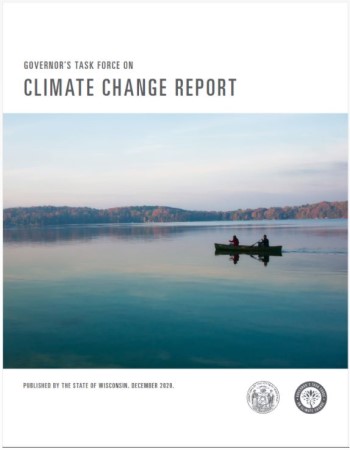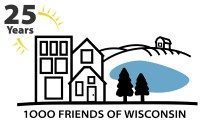This week the Governor’s Task Force on Climate Change released its final recommendations.
1000 Friends of Wisconsin today commends the report for its bold land use and transportation recommendations that would create a cleaner and more equitable Wisconsin.

In February of 2020, 1000 Friends gave a presentation to the entire task force about complete streets and sustainable transportation. In March, we followed up by meeting with Lt. Governor Barnes and his staff. Throughout the year, in conjunction with WISPIRG and RENEW Wisconsin, we produced sign-on letters and attended meetings to promote our sustainable policy recommendations.
Many of our recommendations made it into the final report.
To reduce transportation emissions, the report recommends more investment in walking, biking, and electric vehicle infrastructure. The report also supports additional funding for public transit and high-speed passenger rail. Investment in these modes of travel will create a more sustainable and equitable Wisconsin.
We are also excited to see that some of our land use recommendations were addressed.
Urban forestry received special attention in the report, including a recommendation to raise funds for the Urban Forestry Grants Program at WDNR. 1000 Friends also supports the recommendations to create a statewide resilience plan, especially one that plans with regard to local watersheds instead of county or municipal lines. As Wisconsin experiences more rain and flooding as a result of climate change, it is important that we start planning for a new normal.
There were a few key items that were absent from the final recommendations.
The report stops short of explicitly naming regional transit authorities (RTAs) as a solution, which would help solve many of our current transportation issues. It also did not condemn the role highways as the cornerstone of our transportation emissions, and the Governor continues to explore plans to expand I-94 in Milwaukee. 1000 Friends was also disappointed to not see a mention of reauthorizing the Knowles-Nelson Stewardship Program for another 10 years. While these items were not present in the report, we hope the administration finds other avenues to address these critical issues.
“The recommendations coming out of this report are a good first step toward creating a more sustainable and equitable Wisconsin,” said Deb Nemeth, executive director for 1000 Friends of Wisconsin. “We applaud the focus on public transit, walking, and biking infrastructure and we are pleased to see support for urban forestry. However, there are many barriers to making Wisconsin safer, cleaner, and more equitable. If the Governor continues to pursue Interstate-94’s expansion in Milwaukee, it will run counter to goals and aspirations of their own report. Additionally, Wisconsin needs to reauthorize the Knowles-Nelson Stewardship Program if we want to build a more sustainable, less carbon-intensive state for future generations.”
